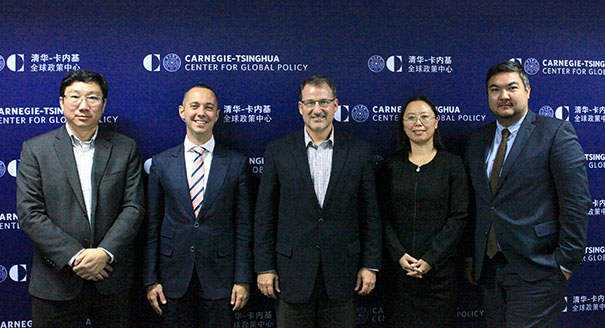Registration
You will receive an email confirming your registration.
In 1981, the United Nations established September 21 as the International Day of Peace in order to promote the ideals of peace around the world. Several decades earlier, Andrew Carnegie founded the Carnegie Endowment for International Peace with the conviction that war could be eradicated through increased international cooperation and stronger institutions.
Last year, the Carnegie–Tsinghua Center hosted its first International Day of Peace event focused on maintaining peace on the Korean Peninsula. In the year since, formal diplomatic efforts resumed as DPRK leader Kim Jong-un met with presidents Moon Jae-in, Donald Trump, and Xi Jinping, but a solution to the North Korea issue remains elusive. One day after the conclusion of the fifth inter-Korean summit, where Kim and Moon met for the third time, Carnegie–Tsinghua Center Director Paul Haenle moderated a discussion with Chinese and international experts on the next steps to achieve enduring peace on the Korean Peninsula.
This event was off the record and held in English.
DISCUSSION HIGHLIGHTS
- The Fluid North Korean Nuclear Situation: The discussants agreed there have been both positive and negative developments with regard to the North Korea nuclear issue over the past year. After Trump’s threats of “fire and fury” and despite North Korea’s increased nuclear testing during the summer of 2017, Kim Jong-un agreed to end North Korea’s intercontinental ballistic missile program (ICBM). The panelists also pointed to increased engagement between the United States and North Korea as a sign the relationship is improving. At the same time, the international consensus on how best to deal with North Korea has broken down. The international community’s support for the maximum pressure campaign has weakened, which has left the United States, South Korea, Russia, China, and Japan to pursue their own North Korea strategies.
- The Changing Geopolitical Landscape: The panelists analyzed the changing geopolitics in Northeast Asia since the Singapore summit, noting that progress on the Korean Peninsula is due to cooperation between all major powers involved. China is believed to be the key to North Korea’s economic stability and seems to be playing a passive yet supportive role from the sidelines. Russia, they said, is not the most powerful country, but it cannot be ignored due to its economic interests in the region. Russia’s policy toward North Korea mostly depends on its relations with the United States, while South Korea is attempting to bridge the gap as a middleman between the United States and North Korea. Panelists argued that South Korea would have to distance itself from the United States in order to gain North Korea’s trust.
- Different Definitions of Denuclearization: Several panelists noted North Korea expects that, in exchange for denuclearizing, other countries would voluntarily give up their nuclear weapons. The United States, however, will not sign a peace declaration with North Korea without its comprehensive, verifiable, irreversible denuclearization (CVID). These different definitions make it difficult to compel North Korea to denuclearize. The panelists also discussed how confusion within the Trump administration on how to proceed limits U.S. diplomatic options.
- Prospects for Lasting Peace: The discussants noted that a potential second Trump-Kim summit later this year could lead to progress on denuclearization and a peace agreement. While another meeting could lead to a deal, panelists remain skeptical given the outcomes of the Singapore summit. Many discussants argued that despite recent progress, the challenges presented by the changing geopolitical landscape and different definitions of denuclearization likely render achieving permanent peace on the Korean Peninsula unlikely. Finally, they noted that if North Korea does not take concrete steps toward CVID, there is a chance the United States will impose a new round of sanctions.
Paul Haenle
Paul Haenle holds the Maurice R. Greenberg Director’s Chair at the Carnegie–Tsinghua Center for Global Policy based at Tsinghua University in Beijing. His research focuses on Chinese foreign policy and U.S.-China relations.
Alexander Gabuev
Alexander Gabuev is a senior fellow and the chair of the Russia in the Asia-Pacific Program at the Carnegie Moscow Center.
Cheng Xiaohe
Cheng Xiaohe is an associate professor in the School of International Studies at Renmin University of China.
Jomart Ormonbekov
Jomart Ormonbekov is a political liaison officer at the United Nations Department of Political Affairs in Beijing.
Yang Wenjing
Yang Wenjing is a research professor and the head of U.S. foreign policy at the Institute of American Studies at the Chinese Institutes of Contemporary International Relations (CICIR).
